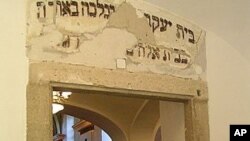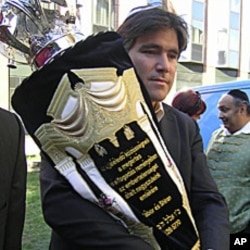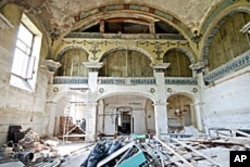After more than half a century, the oldest synagogue in Hungary's capital Budapest reopened Wednesday for the public, just in time for the Jewish New Year. The synagogue was forced to close its doors following the Holocaust, when Hungary became a Communist nation.
Israel has described the event as proof of a Jewish revival in the country, despite concerns about anti-semitism.
Dedication Ceremony Signifies Jewish Renewal
A huge crowd, including Holocaust survivors, celebrated as a scroll of the Torah, the Jewish scriptures, was carefully carried into the 190-year old Obuda Synagogue. The dedication ceremony came ahead of Wednesday's Jewish New Year prayers here.
Israel's Chief Rabbi Yonah Metzger, who had come to Budapest for the events, said the synagogue's re-opening marks a new beginning for Hungary's Jewish community.
"Because of the Holocaust, a lot of people didn't come back to their places in this synagogue," said Metzger. "And after some years, the Communists took it and changed it into a textile museum and than into a studio for the television. So to come here after 50 years shows us that the renaissance in Hungary is real truth."
Metzger adds, however, that many Hungarian Jewish people remain afraid to openly attend religious services. "Because of the trauma of the Holocaust, there are here people who don't think it's necessary to say that they are Jews, because they are afraid that the Holocaust will happen again. Who knows?"
Holocaust Survivors Are Wary, Yet Grateful
Yet several Holocaust survivors still come to listen to rabbis in the same synagogue some of them had attended when they were young.
Among other survivors is 73-year old Andras Szasz, who said it is a miracle that he can be at the re-opening of the synagogue. He explained that he has a document that he was to go on a train for Jewish children to Switzerland. His mother made a mistake with the departure time, though, which was lucky for him as the train was bombed and everyone died. He said a Christian family in Budapest eventually managed to hide him and his parents in their home during the war.
At least 600,000 Hungarian Jews died during the war when Hungary was a close ally of Nazi-Germany.
The young Rabbi Slomo Koves, who leads the Obuda Synagogue, admitted he is concerned about re-emerging extremism in Hungary. The far right Movement for a Better Hungary - or Jobbik - became the third largest party in recent elections.
Answering Racism With Prayers and Community
Koves said, however, the ongoing renovation of his synagogue is the best way to answer such concerns. "The community from its own strength renovates it and uses it again for the same purpose, for prayers. And that is the answer to all those voices that are here [representing] the strengthening anti-Semitism and the strengthening racism. The best answer is to build [and] to get the community together and show that we are still living and give the people the chance to go back to their own identity..."
The Israeli government agrees. In letters, Israel's Prime Minister Benjamin Netanyahu describes the re-opened synagogue as "the symbol of a Jewish renaissance" while Israel's President Shimon Peres says "May it be a house of prayer for everyone."
Jewish officials have made clear they hope that it will also encourage authorities to re-open other former synagogues in Eastern Europe.
With some 100,000 people, Hungary hosts one of Central and Eastern Europe's largest Jewish communities, outside Russia.






